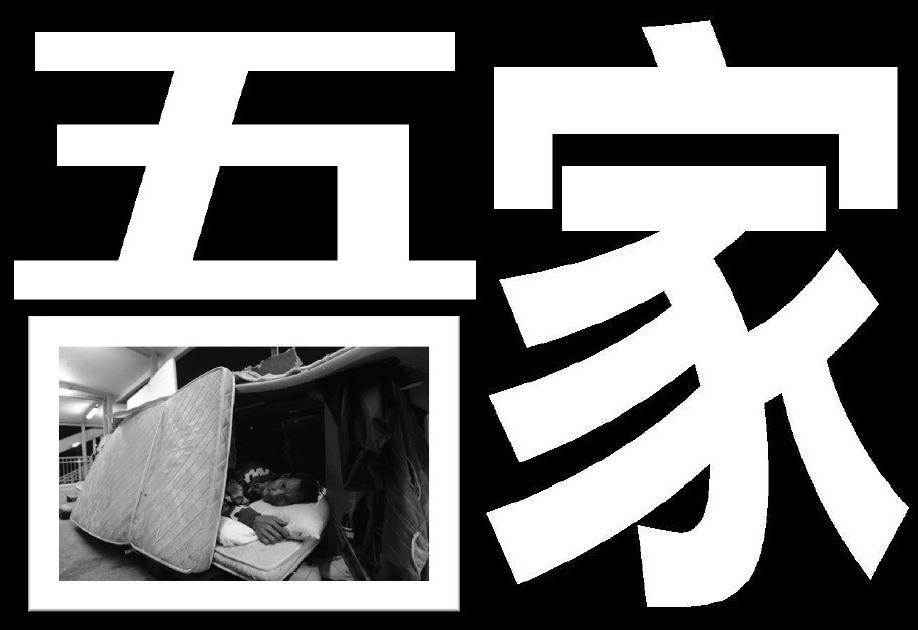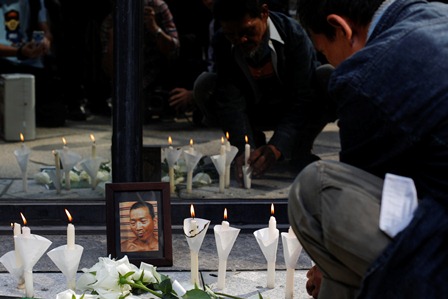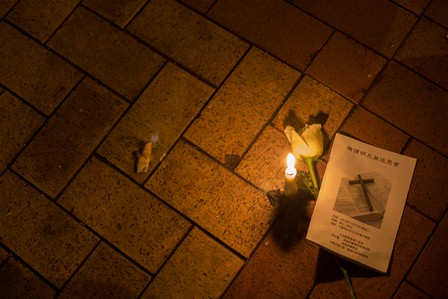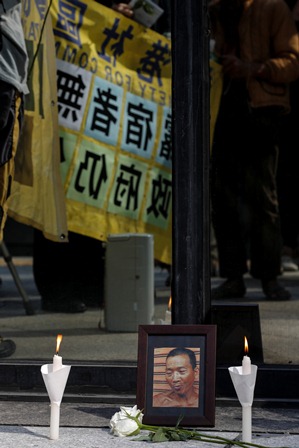About
Exhibition
�i���Ա�
ArtWalk ����M�ɶ� Date
& Time: 18/4/2013 4:30pm - 11:30pm
�i������M�ɶ� Date & Time: 17/4 - 27/4
2013 10:30am - 6:30pm
�a�IVenue: �����������D27�� ���y�e�Y Schoeni Art
Gallery, G/F, 27 Hollywood Road, Central
�d��Enquiry: 2713 9165 (�d�êF Ng Wai Tung,
���Ũ� Irene Chan) |
Back to top
�^����
Photos
of the Homeless
in HK �����S�J�̬ۤ�
|
| |
|
|
|
"For
protection of my own safety, I would believe in anything"
Ah
Lun has many nicknames - "drunkard", "foolish Lun",
"Grosvenor momordica fruit", because he loved drinking
very much and there was always with him a bottle of brown wine
with Grosvenor momordica fruit. Drinking too much led him to a
dreamy state. He always giggled when he talked. Why drinking all
the time? It was because "if I don't drink, I would remember
the old days and cannot fall asleep."
�u���O�ۤv���w�A���A���H�v
���ۦ��ܦh�~���A�u�K�ߡv�B�u�̭ۡv�B�uù�~�G�v�A�Ҧ]�L�ŷR���s�A�����`���@��@�ئ⪺ù�~�G�s�C�s���h�F�N�p�b�ڤ��A�����y�a�̯��C����s������H�]���u�����s�N�|�Q���~�A�N�|�έ��ۡv�C
|
| |
|
|
|
Naked
Friendship
Choosing
to have the starry sky as their roof, and cold concrete ground
as their bed, most street sleepers are naturally solitary and
do not like to socialize with others. However, 65- year-old Ah
Choi was all smiles as he talked to you, "I have a good friend
called Hoi Gor." Hoi Gor is Ah Choi 's "neighbour",
both of them sleeping in Sham Shui Po. The brothers are inseparable
- often sharing food out of the same meal box, and taking turns
to smoke the same cigarette.
���r�ͱ�
��ܥH�P�Ŭ��ˡA�N�B�B�۫˦a���ɡA�S�J�̤j�h�ʮ�t���A���j�R�P�H�橹�A�������������]�o���լո�A�Ͱ_�A�u�ڦ��Ӧn�B�ͥs�����C�v�����O���]���u�F�~�v�A��H�P��`�� �S�J�C
�o���S�J�S�̡A�μv�����A�`�`�@�Ӷ�����H���A�@��ϥJ���y���C �S�J�C
�o���S�J�S�̡A�μv�����A�`�`�@�Ӷ�����H���A�@��ϥJ���y���C
|
| |
|
|
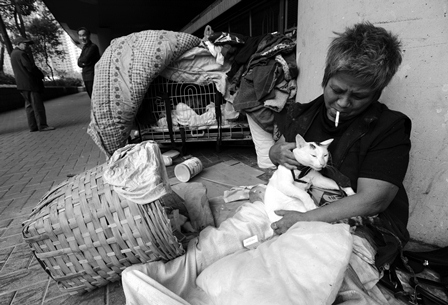
|
"Renting
a cubicle? What happened to my cats and dogs?"
There
were few female street sleepers. Ah Mui was one of the few. Ah
Mui was separated with her husband. Though she still had a daughter,
elder brother, younger sister and mother, this 59-year-old lady
did not get along well with them and slept under the flyover by
herself. But it was not that she could not afford to pay several
thousand dollars to rent a mosquito-size cubicle. In the housing
shortage throughout Hong Kong, no landlord would rent a cubicle
to a single woman with a dog and three cats. As she loves cats
and dogs, she simply slept in the street. A place of 100 to 200
square feet, she lived with four pets leisurely and carefree.
�u���Ц��H�ڪ��ߪ�����H�v
�k�S�J�̫ܤ֡A���f�O�ּƤ��@�C���f��V�Ҥ��}�F�A���M���k��S�f�����ˡA�����Y���M�A59�����o�W�Ө�Φb�Ѿ����C�Ƥd�����A�� �Я�����Ӥ��O�I���_�A���b����ӯ�U�A�S�~�D�@�������@���T�ߤ��樭�k�l�A���F�R�ߪ��A�o���ʨ��W�ΡA�@�a���f���ΤF�ʦh�G�ʧ`�A�ֱo�ۥѦۦb�L�H�ޡC �Я�����Ӥ��O�I���_�A���b����ӯ�U�A�S�~�D�@�������@���T�ߤ��樭�k�l�A���F�R�ߪ��A�o���ʨ��W�ΡA�@�a���f���ΤF�ʦh�G�ʧ`�A�ֱo�ۥѦۦb�L�H�ޡC
|
| |
|
|

|
"I
wish to learn to grow up by myself"
Ah
Ho, Ken, Dick, and Ah Wing (from left to right) had all slept
in the street before. Later, referred by social workers, they
moved into this free short-term "Street Sleepers'
Shelter". The hostel was provided by a charitable organization.
There were eight to twelve bedspaces in a large room. Though it
was just a temporary home, Ah Ho elaborately decorated his single
bedspace. He purposely put a mirror beside the bed. Every morning,
he "combed his hair neatly" before going to work.
�u�ڷQ�Ƿ|�ۤv���j�v
�����BKen�BDick�B���a�]�q����k�^�����g�b���Y�S�J�A��g���u�श�A�J���u���K�O�J�١u�S�J�̤��a�v�C�o�a�J�٥ѷO�����鴣�ѡA�@���j���ئ@���K�ܤQ�G�ӧɦ�C���M���L�O���{�ɪ��a�A�����o�ܥΤߥ��m�ۤv����H�ɦ�C�L�S�N�b���䱾�F����l�A�C���W�Z�e���n���u��谭��Y�v�C
|
| |
|
|
|
Sleeping
with the light on
It
was 11pm. At the Hong Kong Cultural Center in Tsim Sha Tsui, the
sky was still bright with light everywhere. The light pollution
here was the worst in Hong Kong. It was difficult to tell whether
it was day or night. The performances inside the Centre had finished
and the door was closed. Street-sleepers walked one by one to
what they called "the grand hotel" and made preparation.
Among them was a regular visitor Tak Ming - strong build, 6 feet
tall and 40 odd years in age, the prime years of life.
�P���P�v
�ߤW11�ɡA�y�F�C�����Ƥ��ߺ��Ѥ��O�����A�o�إ��ìV�a����A�`�s�H�����M�O��O�]�C�����Ҧ����t���ʧ����A���W���A�S�J�̳���B�ܥL�̤f�����u�j�s���v�dzơA�����]�A�������Ӧ����`���B���ȥ|�Q�h�����~���`�ȼw���C
|
|
Back to
top �^����
Homelessness
in Hong Kong
Homelessness
is a common problem all over the world. It exists in rich and
developed countries like the United States as well as developing
nations such as India. People who are homeless have no access
to the most basic and fundamental resources - they have no roof
over their head, not to mention having adequate food to keep
them from hunger and maintaining personal hygiene.
In
Hong Kong, the increase in the number of the homeless cannot
be overlooked. According to the Social Welfare Department, up
until March 2013, there are 586 registered "street sleepers".
Most of them are men, staying in Yau Ma Tei, Tsim Sha Tsui and
Mong Kwok (30.2%) and Sham Shui Po (51.3%). Over half of them
expressed that the inability to afford rent after they lost
their job is the main reason leading to their homelessness.
Over 40% of homeless individuals are not receiving government
welfare; they mainly survive on unstable and low-paying jobs
or scavenging.
SoCO
has been helping the homeless since 1999. We have noticed that
in order to avoid facing public discrimination and harassments
from the city departments, most of them only appear to sleep
in hidden places after dark. They are highly "nomadic"
and difficult to reach and engage, and thus the statistics from
the Social Welfare Department could be an under-estimation of
the real situation. SoCO estimates that there are around 1,200
street sleepers in Hong Kong.
|
|
�S�J�̦b����
�@�ɦU�a�������S�J�����D�C�L�צb�I�f������B���b�o�i���L���٬O���ǧh�a���a�ϡA�ڭ̳���ݨ��S�J�̪����v�C�L�̴X�G���h�@���H��H�ͦs������A�S���@�ӥi�H�B���m�H���~�ҡA�����H�����T�\�Ź��M�ӤH�å͡C
�b����A�S�J�̪��ƶq�礣�i�����C�ھڪ��|�֧Q�p���Ѫ��ƾڡA�I���2013�~3��A����@��586�W�S�J�̵n�O�b�סC�L�̤j�������G�b�o�y��(30.2%)�M�`�� �a��(51.3%)�A���j�h�ƬO�k�ʡA�W�L�@�b���H���ܡA�S�J���D�n��]�O���~��L�O��I�����������C�t�~�A�W�L40%���S�J�̨õL�������֧Q�A�D�n�̾a�C���J�u�@�άB����͡C �a��(51.3%)�A���j�h�ƬO�k�ʡA�W�L�@�b���H���ܡA�S�J���D�n��]�O���~��L�O��I�����������C�t�~�A�W�L40%���S�J�̨õL�������֧Q�A�D�n�̾a�C���J�u�@�άB����͡C
������ϲ�´��|��1999�~�}�l��U�S�J�̪��u�@�C�ڭ̵o�{�A���j�h�ƪ��S�J�̲ߺD�J�]��~���������a���S�J�A�H�����ת��|�[���M�F���X���C�L�̬y�ʩʷ����A�����Q��IJ�C�]���A���|�֧Q�p�Ҥ��G���S�J�̼Ʀr�ܦ��i��Q�C���C������ϲ�´��|���p�A����j����1200�W�S�J�̡C
|
Back to
top �^����
How does
HK Government treat the Homeless?
|
|
|
|
|
At
present, there is no specific legislation in Hong Kong on whether
citizens can sleep on the street. From its work in the last
14 years, SoCO has found on several occasions that the Government
used "targeting executive measures" to address the
problem of street sleeping. To expel the street-sleepers and
clear the street-sleepers' personal belongings are measures
frequently adopted by the Government. For example:
In 2001 and 2006, the Hong Kong Cultural Centre in Tsim Sha
Tsui on two separate occasions used loudspeakers at late night
to wake up the street-sleepers at an hourly interval;
Starting from 2009, closed the spectator stand in Maple Street
Playground and employed security guards from 11 p.m. to 7 a.m.
to guard the stand and prevent entry by street-sleepers;
In 2011, the Leisure and Cultural Services Department changed
the water-sprinkling arrangement in the "Tung Chau Street
Park". Additional sprinkling took place at 8 p.m. but only
in three kiosks occupied by street-sleepers and not other places
in the park. Furthermore, corrosive antiseptic powder was sprayed
to make the street-sleepers feel itchy on the skin;
On 15 February 2012, the Home Affairs Department, joined by
the Food and Environmental Hygiene Department the Police Force,
mounted an ambush to expel the citizens sleeping under a flyover
in Sham Shui Po. Policemen kicked the street-sleepers to wake
them up while the FEHD staff dumped the personal belongings
of about forty street-sleepers onto refuse trucks.
Uneven stones and decorations were installed under many flyovers
to prevent street-sleepers from sleeping there. Handles were
installed on benches in parks to prevent street-sleepers from
lying down there. The roofs of kiosks were demolished such that
people sleeping there were more exposed to wind and rain.
|
|
|
����F���p�����S�J�̡H
����ثe�õL���T���k�ҳW�w���䥫���O�_�i�H�b���Y�S�J�C�b�L��14�~���u�@���A������ϲ�´��|�𦸵o�{�F���Q�Ρu�w��ʪ���F��q�v�ӳB�z�S�J���D�C�X���S�J�̡B�M�z�S�J�̦b���Y���p�H���~�O�F���`�`�Ĩ�����ʡA�Ҧp�G
- 2001�~�M2006�~�A�y�F�C��Ƥ��ߤ��O�⦸�ϥδ��n���A�b�`�d�ɨC�j�@�p�ɱN�S�J�̥s���@���F
- 2009�~�}�l�A����`��
 �Ϸ����y�����ݥx�A���ΫO�w�ߤW�Q�@�ɦܦ��W�C�ɡA�ݦu�ݥx�����S�J�̶i�J�F �Ϸ����y�����ݥx�A���ΫO�w�ߤW�Q�@�ɦܦ��W�C�ɡA�ݦu�ݥx�����S�J�̶i�J�F
- 2011�~�A�d��p���ܡu�q�{��v���x����k�A�[�}�ߤW�K���x���A���u�O�x���b�T�Ӧ��S�J�̪��D�F���A�����L�a�褣�x���A�å[�W���G�k�ʪ��䯻�A�O�S�J�ֽ̥��P�첪�o�F
- 2012�~2��15��A���F�p�p�P���������ҽåp��ĵ�ȳB�A�����X���b�`��
 �@�Ѿ����U�S�J�������Aĵ�ȤH�����θ}����S�J�̡A�����p¾���A���|�Q�h���S�J�̪��~��W�U�����F �@�Ѿ����U�S�J�������Aĵ�ȤH�����θ}����S�J�̡A�����p¾���A���|�Q�h���S�J�̪��~��W�U�����F
- �b����h�ӤѾ����[�إW�Y���������Y�M�˹����A��ê�S�J���S�J�F�b���骺��Ȥ����[�˧��A�����S�J�̥����F����餺���D�F���\�A�O�b�D�F�U�S�J���H��e�������j�B���C
|
Back to
top �^����
|
|
How
does SoCO work with the Homeless?
SoCO believes that
every street-sleeper should enjoy the dignity and basic human
rights that make a person a human being. To press that the
Government face the street-sleepers' difficult circumstances,
we have done the following:
- Three surveys on
street-sleepers were conducted respectively to assess the street-sleepers'
needs and the effectiveness of existing services:
In 1999, survey
found out new patterns of street sleeping, including younger
age of street sleepers, shorter duration of street sleeping
and street sleeping after midnight. SoCO successfully advocated
the Government to improve the service period of streetsleeper
outreaching team.
In 2010, survey
found that 35% of the respondents are returned Hong Kong residents
and they became streetsleepers due to the discriminatory welfare
policy.
In 2012, survey
found that though the median wage of the street sleepers grew
from HK$3000 to HK$5000, they cannot afford rent because the
instability of work and the ever rising rent.
-
Organise street-sleepers to take various social actions such
as petition, demonstration, meeting with government officials
in order to express their requests�F
-
Assisted over ten street-sleepers to sue the government for
civil claims for their forced eviction and removal of their
personal belongings;
-
Since
2005, co-working with WoFoo Social Enterprises, SoCO organized
every year one new homeless soccer team - the Dawn Football
Team, which participates in the Homeless World Cup.
|
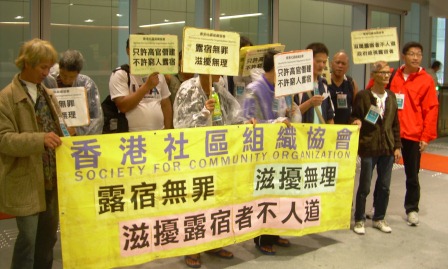
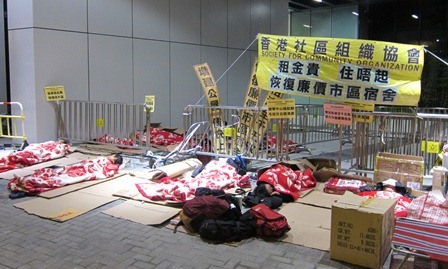
|
�ڭ̦p���U�S�J�̡H
������ϲ�´��|�۫H�A�C�@���S�J�̳����Өɦ��H���L�Y�M�H�v�C���F������F���Ϊ��|�U�ɥ����S�J�̪��x�ҡA�ڭ̴��g�G
- �T���i���S�J�̽լd�A�F���S�J�̻ݨD�M�{���F�����D�G
1999�~�A�o�{�S�J�̥X�{�u�~�C�ơv�B�u�u���ơv�B�u�`�d�ơv�{�H�A���\�O�F�����ܡu�S�J�̥~�i���v���A�Ȯɶ��F
2010�~�A�o�{35%���X���S�J�̬��u�^�y��H�v�A��]�O�L�̳Q�F����F���ƥ��A���q�L�q�k�~�|�A���\���ܺ�F���F
2012�~�A�լd��ܡA�ѩ�̧C�u��ߪk�A�S�J�̤u�ꤤ��ƥ�3,000���W�ɦ�5,000���A�i�����]�u�@��í�w�ί������Q�A�����_�ӡF
- ��´�S�J�̥H���@�B�C��B�����x�������P�����|��ʪ��F�D�D�F
- ��U�Q�h�W�Q�F���L�z�X���ΨS���ӤH�]�����S�J�̱��i�F���A���X���Ư��v�F
- 2005�~�_�A����P�M�I���|���~�C�~�զ��s�@���u�L�a�̨��y���v--�ƥ����y���A�N������ѻP�u�L�a�̥@�ɬסv�C
|
|
|
|
|
| |
|
Voices
from the Homeless People �L�a�̪��n��
|
| |
|
Street-sleepers
are also human beings
At 9.30 a.m. on 15
February 2012, Cheung Gor, who was sleeping on the street in
Sham Shui Po, was "kicked and woken up" by a policeman.
Opening his eyes, he saw himself surrounded by several tens
of policemen and Food and Environmental Hygiene Department staff.
The Police ordered all street-sleepers to leave their sleeping
places but forbade them to take their personal belongings. Cheung
Gor and forty-odd street-sleepers witnessed all their personal
belongings - mattress, clothes, identity cards and bank passbooks
- being dumped onto refuse trucks as if they were rubbish.
It was a cold winter
day. Those street sleepers suddenly lost all their warm clothing.
Angry but helpless, some of them dare not speak up lest the
government would "settle the scores afterwards". However,
ten odd people, including Cheung Gor, Hoi Gor, Ah Cheung and
Ah Lun did not hesitate and intended to stand up. SoCO immediately
organized a meeting with government officials. It was a pity
that no official shouldered responsibility. Finally, the only
way was to sue the government through the judicial process.
As can be imagined,
the street-sleepers faced many difficulties when suing the government.
The 60-year-old Cheung Gor led 19 fellow street-sleepers to
demand the government to pay compensation of $3,000 each and
tender apologies. Unexpectedly, the case dragged on from May
to November 2012. After several twists and turns, the government
eventually paid each street-sleeper $2,000 as compensation but
refused to apologise.
"Even if the
government compensates us $1, I shall be very satisfied. It
is because the payment of compensation amounts to admitting
that they had done wrong. We have won �K" That was what
Hoi Gor said to all the mass media when he walked out of the
court. He felt the society had meted out justice to the street-sleepers.
Unfortunately, during the half year when the litigation was
in process, two of the street-sleepers (Leung Chi Ming and Chan
Kin Ming) passed away in illness and could not hear this late,
good news.
�S�J�̤]�O�H
2012�~2��15�馭�W9�ɥb�A �b�`�� ���Y�S�J��������M�Q�@�Wĵ���u����v�C�L�@���C�}�A�ƤQ��ĵ���M�����p¾���w��L�ιγ���Cĵ��R�O�Ҧ��S�J�����}�ɾQ�A������L�̦��B�p�H���~�C������40�h���S�J�̴N���C�C�ݵۦۤv���Q�Q�B�窫�B�����ҩM�Ȧ�s�P�q�q�Q�����o���A����U�����W�C ���Y�S�J��������M�Q�@�Wĵ���u����v�C�L�@���C�}�A�ƤQ��ĵ���M�����p¾���w��L�ιγ���Cĵ��R�O�Ҧ��S�J�����}�ɾQ�A������L�̦��B�p�H���~�C������40�h���S�J�̴N���C�C�ݵۦۤv���Q�Q�B�窫�B�����ҩM�Ȧ�s�P�q�q�Q�����o���A����U�����W�C
���饿�ȴH�V�A�o�s�L�a�i�k���H��M���h�Ҧ��m�H�窫�A�J�����L�`�A�����H�������n�A��߬F���|�u����b�v�C�������B�����B�����B���۵��Q�h�H�S���S�áA���⮼���ӥX�C������ϲ�´��|�����u���W��´�j�a�P�F���x���}�|���͡A�i���L�F���x���Ӿ�d���A�̫ᱩ���`�q�k�~�|�_�D�F���C
�S�J�̧i�F���A�i�Q�Ӫ��x�������C60���������a��19�W�S�J�S�̡A�V�F�����X�C�H���v3000���ç@�X�D�p���n�D�C�S�Q��A�ץf�P�q2012�~5��@���쩵��11��C�X�g�i��A�F���̲צV�C���S�J�̽��v2000���A�o���L�̤@�ӹD�p�C
�u�N��F���ߤ@�A�A�ڳ��w�g�n���N�A�]���\�a���v�A���N���F���{���A�ڦa�YĹ�F�K�K�v���X�k�x��A������۩Ҧ��ǴC�o�˻��C�L�P��A���|�ש��٤F�S�J�̤@�Ӥ��D�C����Ѫ��O�A�b�ץ�f�P���b�~�ɶ��ءA�䤤����S�J��(��ө��γ�����)���]�f���@�A�S��ť��o�ӿ�Ӫ��n�����C
|
|
| |
|
|
| |
|
Hero of the "returning
Hongkongers"
Yau
Man Fai is a Hong Kong permanent resident. He reached the crossroad
of his life at the age of 60. His employer gave him two choices:
either follow him to work in his garment factory in Jiangxi
as a "quality control technician" with a monthly income
of $8,000, or to be fired. Forced by the reality, Yau Man Fai
followed the employer to lead the life of "immigrant in
the mainland". The year 2008 saw the financial turmoil.
The factory closed down overnight. The 64-year-old Man Fai migrated
back to Hong Kong.
When he was about to use up his saving and had no fixed residence,
Man Fai applied for Comprehensive Social Security Assistance.
Unexpectedly, staff of the Social Welfare Department told him,
"You are not qualified to apply for CSSA. Only those who
have lived in Hong Kong for 309 days or more can apply."
Man Fai had no choice but to move into the "pigsty"
in Yuen Long, paying a rent of $700 per month. The neighbours
of his "pigsty" advised him to seek help from SoCO.
SoCO helped him to proceed with judicial review in order to
take the government to court and tell the society that the welfare
of "returning Hongkongers" should not be "taken
away for 10 months". After three years' litigation, eventually
in February of 2012, Yau Man Fai won the case again in the Court
of Appeal.
At present, the right of "returning Hongkongers" to
apply for CSSA has been revived. A social worker once asked
Man Fai whether he felt he had become "the returning Hongkongers'
hero". Man Fai replied, "The government is doing injustice.
I have merely done what I ought to do."
|
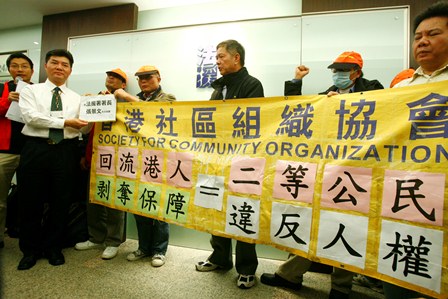
�u�^�y��H�v���^��
�����O����ä[�~���A60���ɥL�J�W�H�ͪ��Q�r���f�C���L������G�@�O��L�^����ٻs��t��¾�u���ˮv�ǡv�A��J�����K�d���A�@�O���F�L�C����{��A���������u�����j���v�ͬ��C2008�~���S�I�W���ĭ��ɡA�u�t�@�]�˳��A64��������^�y�����C
�L�t�ֱN�κɡA�S�~�L�w�ҡA����h�F�ӽк�C���ƪ��p¾���i�D�L�G�u�A���X��ӽк�A�n�b�������309��~�i�ӽСv�C����L�i�`��A�J�F���Ԧ��u�ޫΡv�A�]���믲�~�C�ʤ��C�u�ޫΡv�Ǫ��F�ٱХL�����D�U�A�����U�L�i��q�k�Ю֡A�N�F���i�W�k�x�A�i�D���|�u�^�y��H�v���֧Q�����Q�u���10�Ӥ�v�C�g�L3�~���x�q�A12�~2��������x�q�ש�b�W�D�x�A���ӶD�C
�{�ɡA�u�^�y��H�v�w�g��_�F�ӽк���v�Q�C
�@���A���u�ݤ�����_ı�o�ۤv���F�u�^�y��H���^���v�A����^�����G�u�F�������q�A�ڥu�O���F�������ơC�v
|
|
|
Back
to top �^����
|
|
Society
for Community Organization (SoCO) ������ϲ�´��|
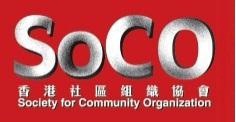
SoCO
was founded in 1972 and is a registered non-profit making non-governmental
human rights organization for the underprivileged. SoCO's mission
is to serve the most underprivileged in Hong Kong, including
cage and cubicle dwellers, the single elderly, new immigrant
women, children living in poverty, street-sleepers, people with
mental illness, low-paid workers, refugees and ethnic minorities.
'For
People, We Care; For Justice, We ACT!' Over the past four decades,
SoCO stands together with the grassroots and conducts hundreds
of social actions advocating for their fundamental human rights
and advocating fair and just social policy.
������ϲ�´��|��1972�~���ߡA���U���@���D�ȧQ�������H�v��´�A�D�O�A�ȥ���h�x���s�A�]�A:
Ţ�ΡB�O�Я���B�W�~�ѤH�B�s�������k�B�h�a�ൣ�B�S�J�̡B�믫�f�d�_�̡B�C�~�u�H�B�����ΤּƱڸǵ��C
�P�z�ըêӡA�����q��ʡI ������ϲ�´��|�Ϯڥ����h40�~�A�P�O��´�̵L�U���z�ժ��s�A�z�L�L�ƪ��|��ʡA�Ҿɤ����M�X�z�����|�F���A�O�٤������v�Q�C
Back
to top �^����
|
|
|
Acknowledgements
����
Exhibition
contributors:
�D��
Organizer : ������ϲ�´��|SoCO, Hong Kong ArtWalk
��v Photograph : �p��@ LEI Jih-sheng
���v Video : �B���� Alan LAU
��r Writing : ����� HO Mei Wah, �d�êF NG Wai Tung, ���Ũ� CHAN
Sin Yee
�����]�p Graphic Design : ���� QIU Chen
½Ķ Translation : �d�~�� NG Hon Wah, �{���� Constance CHING,
�����i Mia DU, �B���Q LAU Wan Yan
�i���٧U Exhibition Sponsor : ArtWalk
���a�٧U Venue Sponsor : Schoeni Art Gallery
|
Photo
Journalist LEI Jih-sheng
LEI
Jih-sheng is a veteran photo journalist with over 20 years'
experience. He currently works at Sing Tao Daily as chief photo
journalist. He is the winner of the Amnesty International's
Human Rights Press Awards, as well as awards from Newspaper
Society of Hong Kong and Hong Kong Press Photographers Association.
Since
1999, LEI has been working with SoCO as a volunteer, documenting
life of street sleepers. In 2002 and 2007, exhibitions named
"Homeless" and "Homeless II" were held with
publications of the same titles. Through his camera, LEI hopes
to enhance social concern over the disadvantaged in Hong Kong.
|
|
��v�O�� �p��@
�p��@�q�Ʒs�D��v�u�@�W�L20�~�A�{¾�P�q������u��v�O�̡C�L�����گS�j��´�H�v�s�D���A�έ�����~���|�έ�����v�O�̨�|���h�ӷs�D��v�����C
�p��@��1999�~�}�l��������ϲ�´��|�q�Ƹq����v�u�@�A�O���S�J�̪��ͬ��A���O��2002�~�M2007�~���X�m���J�n�M�m���J�G�n���i���A��@�~������P�W��v���C�L�Ʊ�z�L��v�A�O���|�U�ɧ����`����C�U���h���x�ҡC
|
| |
|
Reporter HO Mei
Wah
HO
Mei Wah's career as journalist has begun ever since her graduation
from university. Now she is the Executive Chief Editor of iMoney,
a financial magazine managed by Hong Kong Economic Times. She
interviews billionaires as well as penniless street sleepers,
going in and out of luxurious hotels and cubicles in Sham Shui
Po. She wrote publications "Homeless" and "Homeless
II" in collaboration with SoCO, witnessing the city's change
over last decades of years.
�O�� �����
�j�Dz��~��Ĥ@���u�@�K���O�̦ܤ��A�{������m�g�٤���n�X�U�]�g���ӡmiMoney�n����D�s�C�ijX��H�]�A���U�I���]�]�A���L�����S�J�̡F�g�`�X�J�ijX�a�I�]�A�b�s���v���P�Űs���A�]�]�A�`�� �O���СC���X�ۡm���J�@�n�Ρm���J�G�n�A���ҳo���S�J�̹L�h�Q�h�~�ܾE�C �O���СC���X�ۡm���J�@�n�Ρm���J�G�n�A���ҳo���S�J�̹L�h�Q�h�~�ܾE�C
|
|
| |
|
Director Alan
LAU
Alan
LAU is a director based in Hong Kong. He has worked on many
challenging documentaries for numerous TV channels, including
National Geographic Channel, BBC, ATV, RTHK and CCTV, with topics
on history, social issue and environment protection. Those films
gained many international prestigious awards including an award
of Silver Lucite Hugo in 2007 Chicago International Film Festival
and a Gold Panda International Documentary Award. He recently
produced the feature documentary "Missing Home" about
the orphans from Sichuan earthquake.
�ɺt �B����
�B���ۡA����ɺt�A������a�a�z�W�D�B�^��s�����q�B���䦳�u�q���x�B����q�x�M�����q���x���ɦh���I���D�ԩʪ��������A�D���A�Ϊ��|�ɹ��B���v�M���O�C�L���v������o�h����ڶ��ءA�]�A2007�~�ۥ[����ڹq�v�`Silver
Lucite Hugo���B�|�t�q���`�u�����ߡv���������C����L�觹�����`�|�t�j�a�_�t��������m�Q�a�n�C
|
| |
Misereor,
Evangelischer Entwicklungsdienst - EED, Maryknoll Sister of
St. Dominic, Community Chest of Hong Kong, Hong Kong Artwalk
SoCO
is the Hong Kong ArtWalk 2013 benefiting charity
|
Back to the top
�^����
Society
for Community Organization (SoCO) All Rights Reserved. ������ϲ�´��|
���v�Ҧ� ½�L���s
|
|
